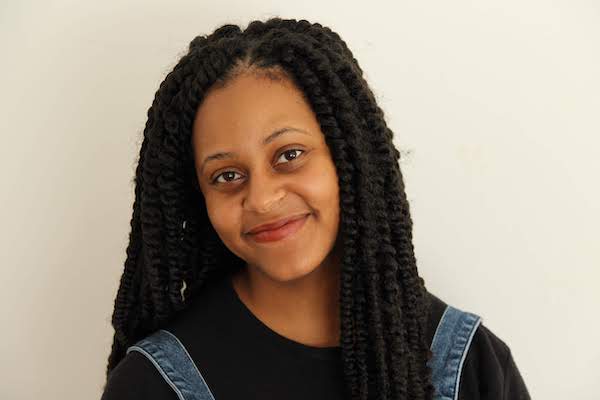Theater Preview: “Citrus” — World Premiere of a Choreopoem
By Susan B. Apel
The stories in Citrus exhibit a powerful commonality: these portraits of the experiences of black women suggest that, over time, everything and nothing has changed.
Citrus by Celeste Jennings. Directed by JaMeeka Holloway-Burrell. Staged by Northern Stage at the Barrette Center for the Arts, 74 Gates Street, White River Junction, VT, February 26 through March 15.

Playwright and costume designer Celeste Jennings. Her choreopoem Citrus will receive its world premiere at Northern Stage. Photo: Isaac Lorton.
Celeste Jennings, a 2018 graduate of Dartmouth College, created the first iteration of this work, which brings black women to the stage to tell their own stories through monologue, dialogue, music, and movement, as a student during her sophomore year. Inspired by the late Ntozake Shange (who coined the term “choreopoem” for her iconic ’70s work for colored girls who have considered suicide/when the rainbow is enuf), Jennings sought to articulate her own voice and those of her contemporaries in a storytelling medium that was more fluid and dynamic than a traditional play. After an initial staged reading at Northern Stage’s New Works Now festival in 2019, Jennings went on to receive the Hip Hop Theatre Creator Award from the American College Theatre Festival at the Kennedy Center for a reworked version of Citrus. The current production (“Citrus 3.0,” as Jennings refers to it) has morphed into a piece that includes nine actors and spans a time period from just before the Emancipation Proclamation in the 1860s to the present day. The cast now proffers a range of characters, from a 19-year-old to a woman in her 60s.
Director JaMeeka Holloway-Burrell describes the work as nonlinear. It strives to be unpredictable as it skips back and forth through history and various art forms. Characters speak in prose and in poetry. Movements range from stylized versions of everyday motions (such as washing one’s face) to a fully choreographed dance number. The score includes traditional spirituals such as “Amazing Grace” and “Roll, Jordan, Roll,” and an excerpt from the Billie Holiday classic “Strange Fruit.” One of the opening segments (and a favorite of Holloway-Burrell’s), “Ice Coffee Privilege,” is a group lament about the challenges that confront black women. It is set on a relaxed Friday night among friends who take the opportunity to vent. Another vignette illuminates the show’s title; Jennings focuses on the simple act of eating an orange and uses the fruit as a metaphor through which to explore the perceptions of black women.
Northern Stage’s involvement in Citrus’s move from the page to the stage has been notably loyal. Artistic director Carol Dunne was so taken with the script she insisted on adding it to the current season’s offerings, even after the year’s schedule had already been confirmed. The production process has been unusual, given the collaborative style of the script and the close working relationship between director and playwright. Jennings is not only the author of Citrus, she is also its costume designer. (She is serving as Northern Stage’s current Costume Shop manager). Holloway-Burrell admits that there are challenges in working so closely with the show’s originator, but she is using it as a way to explore the advantages of what she calls her nonhierarchical directing style. Dramatist and director have worked together from the original staged reading of Citrus; at this point, the two have developed a sometimes wordless, read-my-face style of communication when critiquing a scene in rehearsal. “I’m not ego-driven,” explains Holloway-Burrell. “Just because it’s my idea doesn’t automatically mean it’s the best.” She is always looking for “that happy medium.” She sees the actors, and particularly Jennings (who might still be suggesting some line changes), as valuable creative resources.
This is far from your conventional history play. Jennings’s characters speak to each other across time, their lyrical conversations dramatizing personal and universal truths. Holloway-Burrell notes that, despite being separated by many decades, the stories exhibit a powerful commonality: these portraits of the experiences of black women suggest that, over time, everything and nothing has changed.
Susan B. Apel is a freelance writer whose work has appeared in various online and print publications such as the Fredericksburg Literary and Art Review, Literary Mama, and Persimmon Tree. Her blog, Artful, in which she writes about the arts in the Upper Connecticut River Valley, appears regularly at http://artful.substack.com She is an art correspondent for The Woven Tale Press and a former legal columnist for the newspaper Vermont Woman. She lives in Lebanon, NH.
Tagged: Celeste Jennings, Citrus, JaMeeka Holloway-Burrell, Northern Stage

Thank you for your insights. I would like to read the choreopoem too, but need a copy. Can you spare one?
Linda Rohrer Paige
lrohrerpaige@gmail.com